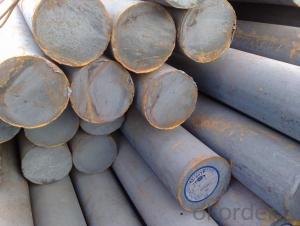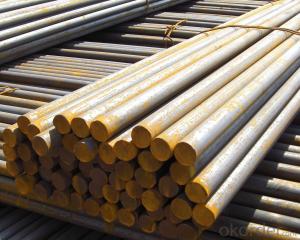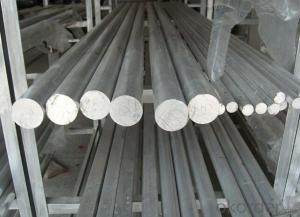Special Steel AISI 5140 Mild Carbon Steel
- Loading Port:
- China main port
- Payment Terms:
- TT or LC
- Min Order Qty:
- 25 m.t.
- Supply Capability:
- 10000 m.t./month
OKorder Service Pledge
OKorder Financial Service
You Might Also Like
Item specifice
The details of our Steel
1. Produce Standard: as the GB, AISI, ASTM, SAE, EN, BS, DIN, JIS Industry Standard
2. Produce processes: Smelt Iron -EAF smelt Billet - ESR smelt Billet -Hot rolled or forged get the steel round bar and plate
3. Heat treatment:
Normalized / Annealed / Quenched+Tempered
4. Quality assurance:
All order we can received Third party inspection, You can let SGS, BV,.. and others test company test and inspect our products before Goods shipping.
Product information
Chemical Composition(GB)%
C | Si | Mn | Cr | Ni |
0.37-0.44 | 0.17-0.37 | 0.50-0.80 | 0.80-1.10 | ≤0.30 |
Heat Treatment
Item | Temperature ℃ | Hardness |
Normalizing | 850-870 | 179-229HB |
Characterstics: Which has the best comprehensive mechanical properties
Applications
1.Can be used for drawing die and plastic mould | |||
2.Can be used for middle and small punch |
Main product
Plastic Mould Steel
DIN 1.2311,1.2738,1.2083,1.2316 etc.
AISI P20,P20+Ni,420 etc.
JIS SUS420J2
Hot Work Steel
DIN 1.2344,1.2343,1.2367,1.2365,1.2581,1.2713 etc.
AISI H13,H11,H10,H21, etc.
JIS SKD61,SKD6,SKD5,SKT4 etc.
Cold Work Steel
DIN 1.2739, 1.2601, 1.2080, 1.2436, 1.2631, 1.263, 1.2510, 1.2327 etc.
AISI D2, D5, D3, D6, A8, A2, O1 etc.
JIS SKD10, SKD11, SKD1, SKS3 etc.
High Speed Steel
DIN 1.3343, 1.3243, 1.3247, 1.3355 etc.
AISI M2, M35, M42, T1 etc.
JIS SKH51, SKH35, SKH59, SKH2 etc.
Alloy Structural Steel
DIN 1.7035,1.6511,1.7220,1.7225 etc.
AISI 5140, 4340, 4135, 4140 etc.
JIS SCr440,SNCM439,SCM435,SCM440 etc.
Stainless & Carbon Steel or Others
DIN 1.4125,1.1191 etc
AISI 440C,1045, 1020 etc.
JIS SUS440C,S45C etc
Product show

Workshop show

- Q:Can special steel be used in the wind turbine manufacturing industry?
- Yes, special steel can be used in the wind turbine manufacturing industry. Special steel, such as high-strength or corrosion-resistant alloys, is often used in the construction of wind turbine components due to its durability, strength, and resistance to harsh environmental conditions. These specialized steel alloys help ensure the longevity and performance of wind turbines in the renewable energy industry.
- Q:How does special steel contribute to the manufacturing of cutting blades for industrial machines?
- Special steel plays a crucial role in the manufacturing of cutting blades for industrial machines by offering enhanced strength, durability, and wear resistance. The unique properties of special steel, such as high hardness, toughness, and corrosion resistance, allow cutting blades to withstand the demands of heavy-duty applications. This enables them to cut through various materials, such as metal or concrete, with precision and efficiency, resulting in improved productivity and longevity of industrial machines.
- Q:How does special steel perform in terms of electrical resistivity?
- Special steel typically has higher electrical resistivity compared to other types of steel. This means that it offers greater resistance to the flow of electric current, making it less conductive.
- Q:How does special steel perform in terms of machinability?
- Special steel generally has good machinability due to its composition and properties. It is often designed or treated to have improved cutting and machining characteristics, such as increased hardness, toughness, and wear resistance. This allows for efficient and accurate machining operations, resulting in high productivity, better surface finish, and reduced tool wear. However, the machinability of special steel can vary depending on the specific grade, heat treatment, and machining conditions used.
- Q:What are the environmental impacts of using special steel?
- Special steel can cause several environmental effects. To begin with, the extraction of raw materials like iron ore and coal for special steel production results in deforestation, destruction of habitats, and loss of biodiversity. This mining process also releases pollutants into the air, soil, and water, contributing to pollution. Special steel production also emits greenhouse gases, especially carbon dioxide (CO2), during manufacturing. The high temperatures required to melt and shape the steel, along with the energy-intensive processes involved, lead to significant CO2 emissions that contribute to climate change. Moreover, the transportation of special steel has its own environmental consequences. The shipping and logistics involved in transporting the steel from production facilities to end-users generate additional greenhouse gas emissions, air pollution, and fuel consumption. Additionally, the disposal of special steel products at the end of their lifecycle poses environmental challenges. If not properly recycled or disposed of, steel products can end up in landfills, taking up valuable space and potentially releasing harmful substances into the environment. Despite these environmental impacts, it is important to acknowledge that special steel is frequently used in various industries due to its durability, strength, and resistance to corrosion. Efforts are being made to mitigate these impacts by adopting cleaner production methods, such as recycling and utilizing renewable energy sources in the steel manufacturing process. Additionally, initiatives like carbon capture and storage are being explored to reduce greenhouse gas emissions from steel production. In conclusion, although special steel offers numerous benefits, it is crucial to balance these advantages with the need to minimize its environmental impacts through sustainable production and responsible disposal practices.
- Q:What is the significance of vanadium in special steel?
- Vanadium is a significant element in special steel due to its unique properties and effects on the steel's performance. Special steel refers to high-quality, high-performance steel that is designed for specific applications where strength, durability, and other specific characteristics are required. One of the main reasons vanadium is used in special steel is its ability to increase the strength and toughness of the steel. Vanadium forms very strong carbides within the steel's microstructure, which help to prevent grain growth and improve the steel's resistance to deformation and cracking. This makes the steel highly suitable for applications that require excellent strength, such as in the construction of bridges, high-rise buildings, and machinery. In addition to strength, vanadium also enhances the hardenability of the steel. Hardenability is the ability of the steel to be hardened through heat treatment processes, such as quenching and tempering. Vanadium increases the hardenability of the steel, allowing it to be easily hardened to achieve the desired properties, such as increased wear resistance and improved cutting performance. This makes vanadium-containing special steel ideal for tools, dies, and other applications that require hardness and wear resistance. Furthermore, vanadium contributes to the steel's corrosion resistance. It forms stable oxide layers on the surface of the steel, which act as a protective barrier against corrosion and oxidation. This is particularly beneficial in environments where the steel is exposed to harsh conditions, such as marine environments or chemical processing plants. Moreover, vanadium also improves the heat resistance and thermal stability of special steel. It helps to retain the steel's strength and hardness at elevated temperatures, making it suitable for applications that involve high-temperature environments, such as aerospace components and automotive engine parts. Overall, the significance of vanadium in special steel lies in its ability to enhance the steel's strength, toughness, hardenability, corrosion resistance, and heat resistance. These properties make vanadium-containing special steel highly sought after in various industries where exceptional performance and reliability are required.
- Q:How does special steel perform in abrasive wear conditions?
- Special steel is specifically designed to perform exceptionally well in abrasive wear conditions. Its unique composition and manufacturing process make it highly resistant to the detrimental effects of abrasion. The presence of alloying elements such as chromium, manganese, and molybdenum in special steel significantly enhances its hardness and toughness. These elements help to form carbides within the steel matrix, which act as barriers against abrasion. The carbides effectively resist the forces exerted by abrasive particles, preventing them from causing significant damage to the steel surface. Furthermore, special steel undergoes specialized heat treatment processes such as quenching and tempering, which further enhance its resistance to abrasive wear. These processes not only increase the hardness of the steel but also improve its overall toughness and durability. As a result, special steel is capable of withstanding high levels of abrasion without experiencing significant wear or deterioration. In addition to its exceptional mechanical properties, special steel also exhibits excellent corrosion resistance. This is achieved through the addition of elements such as chromium, which forms a protective oxide layer on the steel surface. This oxide layer acts as a barrier, preventing corrosive substances from reaching the underlying steel and causing further damage. Overall, special steel performs exceptionally well in abrasive wear conditions. Its unique composition, heat treatment processes, and corrosion resistance properties make it an ideal material for applications where abrasion is a major concern. Whether in mining, manufacturing, or other industries where abrasive wear is prevalent, special steel can provide superior performance and extended lifespan, ensuring optimal efficiency and cost-effectiveness.
- Q:How does special steel perform in cryogenic creep resistance?
- Special steels are known for their excellent cryogenic creep resistance. They exhibit minimal deformation and maintain their mechanical properties even at extremely low temperatures. This makes them highly suitable for applications in cryogenic environments where materials are subjected to significant stress over prolonged periods.
- Q:What are the applications of special steel in the agriculture supply chain?
- Special steel has several applications in the agriculture supply chain. It is commonly used in the manufacturing of farm equipment and machinery such as tractors, plows, and harvesters. Special steel's high strength and durability make it ideal for these heavy-duty applications, ensuring that the equipment can withstand the demanding conditions of the agricultural sector. Additionally, special steel is also used in the production of storage tanks and silos, providing a robust and reliable solution for storing grains, fertilizers, and other agricultural products.
- Q:How is special steel stored and transported?
- To maintain the quality and integrity of special steel, it is handled with utmost care during storage and transportation. During storage, the steel is kept in a controlled environment with the right temperature and humidity levels to prevent corrosion and damage. Covered warehouses and storage facilities specifically designed for steel are used to shield it from rain, snow, and sunlight. When it comes to transportation, different methods are employed depending on the quantity and distance. For short distances, smaller amounts of steel are transported using trucks equipped with flatbeds or enclosed trailers. These trucks are designed to securely hold and protect the steel, ensuring it does not shift or get damaged during transit. However, for longer distances or larger quantities, rail or sea transportation is preferred. Rail transportation offers a smooth and stable journey, minimizing the risk of damage caused by vibrations or sudden movements. Specially designed railcars are used to securely store and protect the steel during transit. Sea transportation involves loading the steel onto shipping containers or specialized vessels. Containers are sealed and secured to prevent any movement or damage during the journey. Specialized vessels, such as roll-on/roll-off ships or heavy-lift vessels, are used for oversized or extremely heavy steel components. In all cases, special steel is carefully packaged and secured using appropriate materials like wooden crates, steel strapping, or plastic wrapping to prevent scratches or dents. The transportation process is closely monitored, and necessary precautions are taken to ensure the steel reaches its destination in optimal condition. Overall, the storage and transportation of special steel require thorough planning, proper handling, and the use of specialized equipment to safeguard its quality and protect it from potential damage or degradation.
1. Manufacturer Overview |
|
|---|---|
| Location | |
| Year Established | |
| Annual Output Value | |
| Main Markets | |
| Company Certifications | |
2. Manufacturer Certificates |
|
|---|---|
| a) Certification Name | |
| Range | |
| Reference | |
| Validity Period | |
3. Manufacturer Capability |
|
|---|---|
| a)Trade Capacity | |
| Nearest Port | |
| Export Percentage | |
| No.of Employees in Trade Department | |
| Language Spoken: | |
| b)Factory Information | |
| Factory Size: | |
| No. of Production Lines | |
| Contract Manufacturing | |
| Product Price Range | |
Send your message to us
Special Steel AISI 5140 Mild Carbon Steel
- Loading Port:
- China main port
- Payment Terms:
- TT or LC
- Min Order Qty:
- 25 m.t.
- Supply Capability:
- 10000 m.t./month
OKorder Service Pledge
OKorder Financial Service
Similar products
New products
Hot products
Hot Searches
Related keywords






























